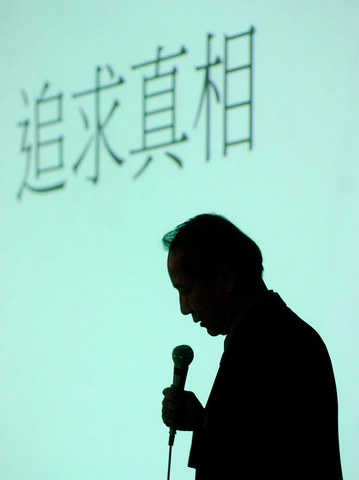Human rights advocates yesterday asked the Democratic Progressive Party (DPP) government to put more effort into uncovering the truth behind murders and other crimes that occurred during the martial-law era under the former Chinese Nationalist Party (KMT) government.
The appeal came on the 25th anniversary of the murder of Chen Wen-chen (陳文成). Chen's bruised and battered body was discovered on July 2, 1981 on the campus of National Taiwan University after he had been taken away by the Taiwan Garrison General Headquarters (TGGH) the day before.
Chen was an assistant professor at Carnegie Mellon University who was involved in the Taiwan democracy movement. He had returned to Taiwan from the US to visit his family. His murder attracted significant attention and pressure from the international community.

PHOTO: LO PEI-DER, TAIPEI TIMES
At a conference yesterday held to discuss achieving "transitional justice," human-rights lawyer Kenneth Chiu (
The garrison headquarters initially claimed that Chen had committed suicide because he feared being arrested for crimes, but changed its account the following day, saying that he had died in an accident.
US forensic pathologist Cyril Wecht, who traveled to Taiwan to investigate the case, concluded that Chen's death was caused by his being dropped from the fifth floor while unconscious, and that his death was a homicide.
Chiu cited the names of prosecutors and judges in charge of the Kaohsiung Incident (
He said that those responsible for White Terror incidents such as the murder of former DPP party leader Lin I-hsiung's (林義雄) family have neither been identified nor punished.
"Is the denial of justice a social value of Taiwan?" Chiu asked.
Writer Lin Shih-yu (林世煜) also asked the government not to drag its feet in declassifying documents related to Chen's murder and other incidents in order to uncover the truth and provide justice for the victims and their families.
Meanwhile, Taipei Prosecutor Chuang Chun-jen (莊俊仁), who is currently in charge of the investigation of Chen's murder, was quoted yesterday in a Central News Agency (CNA) report saying that it had been difficult to collect new evidence and find the perpetrators in the case.
"Because the materials relating to Chen's questioning at the TGGH are missing, and key TGGH officials in charge of Chen's case have emigrated to foreign countries, it is hard to make any breakthrough in the case," the CNA story quoted him as saying.
Chen's elder sister Chen Pao-yueh (陳寶月), who has sought an explanation from the government on her brother's murder for more the 25 years, filed a lawsuit in 2001 against former TGGH head Wang Ching-hsu (汪敬煦) and four other officials, in the hope of finding an explanation for his mysterious death.
Chen Pao-yueh said she was disappointed that there had been no progress in the lawsuit. She also said that her family had expected that President Chen Shui-bian (陳水扁) would help after he took office, but that they had been disappointed, and so decided to find the truth by themselves.

An essay competition jointly organized by a local writing society and a publisher affiliated with the Chinese Communist Party (CCP) might have contravened the Act Governing Relations Between the People of the Taiwan Area and the Mainland Area (臺灣地區與大陸地區人民關係條例), the Mainland Affairs Council (MAC) said on Thursday. “In this case, the partner organization is clearly an agency under the CCP’s Fujian Provincial Committee,” MAC Deputy Minister and spokesperson Liang Wen-chieh (梁文傑) said at a news briefing in Taipei. “It also involves bringing Taiwanese students to China with all-expenses-paid arrangements to attend award ceremonies and camps,” Liang said. Those two “characteristics” are typically sufficient

A magnitude 5.9 earthquake that struck about 33km off the coast of Hualien City was the "main shock" in a series of quakes in the area, with aftershocks expected over the next three days, the Central Weather Administration (CWA) said yesterday. Prior to the magnitude 5.9 quake shaking most of Taiwan at 6:53pm yesterday, six other earthquakes stronger than a magnitude of 4, starting with a magnitude 5.5 quake at 6:09pm, occurred in the area. CWA Seismological Center Director Wu Chien-fu (吳健富) confirmed that the quakes were all part of the same series and that the magnitude 5.5 temblor was

The brilliant blue waters, thick foliage and bucolic atmosphere on this seemingly idyllic archipelago deep in the Pacific Ocean belie the key role it now plays in a titanic geopolitical struggle. Palau is again on the front line as China, and the US and its allies prepare their forces in an intensifying contest for control over the Asia-Pacific region. The democratic nation of just 17,000 people hosts US-controlled airstrips and soon-to-be-completed radar installations that the US military describes as “critical” to monitoring vast swathes of water and airspace. It is also a key piece of the second island chain, a string of

The Central Weather Administration has issued a heat alert for southeastern Taiwan, warning of temperatures as high as 36°C today, while alerting some coastal areas of strong winds later in the day. Kaohsiung’s Neimen District (內門) and Pingtung County’s Neipu Township (內埔) are under an orange heat alert, which warns of temperatures as high as 36°C for three consecutive days, the CWA said, citing southwest winds. The heat would also extend to Tainan’s Nansi (楠西) and Yujing (玉井) districts, as well as Pingtung’s Gaoshu (高樹), Yanpu (鹽埔) and Majia (瑪家) townships, it said, forecasting highs of up to 36°C in those areas